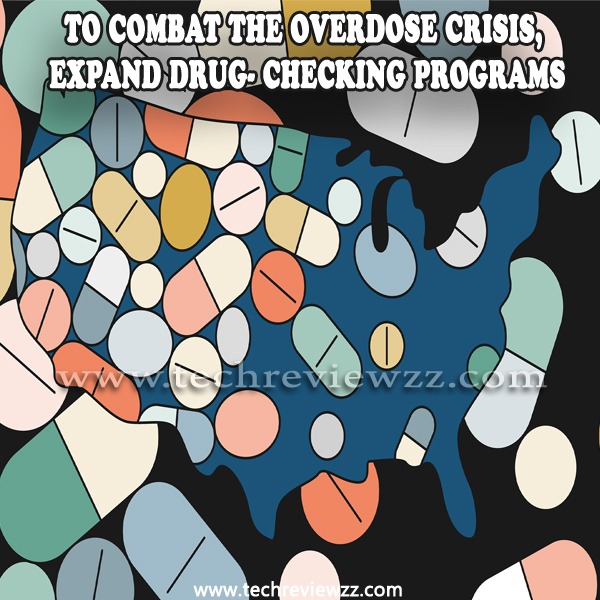To Combat the Overdose Crisis, Expand Drug- Checking Programs

Introducing a groundbreaking result to combat the ruinous overdose extremity that continues to persecute our communities. It’s time to suppose outside the box and grasp innovative approaches that have the eventuality to save numerous lives. One similar approach is expanding medicine-checking programs, a revolutionary conception that not only empowers individuals but also provides them with pivotal information demanded for informed opinions. In this blog post, we will explore how medicine-checking programs can be a game-changer in diving the overdose extremity and bandy ways to apply these life-saving enterprises effectively. Brace yourself for an eye-opening read as we claw into this critical matter!
Background
The rise in medicine overdoses has come an intimidating public health extremity, gripping communities across the globe. The added frequency of potent synthetic medicines and the lack of information about their composition have contributed to this dire situation. In response, innovative detriment reduction strategies are being explored, one of which is medicine-checking programs.
These programs aim to give individuals with accurate and timely information about the substances they intend to consume. By exercising technical outfits similar to spectrometers or reagent tests, this enterprise can identify implicit pollutants or pollutants present in lawless medicines. This knowledge empowers druggies to make informed opinions regarding their substance use and reduces the threat of detriment associated with unknown substances.
also, medicine-checking programs offer a unique occasion for outreach workers and healthcare professionals to engage with vulnerable populations. These relations not only grease detriment reduction education but also foster trust between service providers and individuals who may be reluctant or resistant to seeking help.
still, it’s important to admit that enforcing medicine-checking programs presents certain challenges. Legal walls frequently hamper the establishment of these services due to enterprises girding medicine possession laws and liability issues. likewise, resource constraints related to backing and labor force can limit program vacuity.
Despite these obstacles, expanding access to medicine- checking services remains pivotal in combating the overdose extremity. Airman systems have demonstrated promising results by reducing hospitalizations related to defiled medicines while also furnishing openings for intervention through comforting or referral services.
To truly address this critical issue on a larger scale, policymakers must prioritize removing legal impediments that help the wide perpetration of these programs while allocating acceptable coffers for training staff members and acquiring necessary outfits.
By embracing substantiation-grounded detriment reduction approaches like medicine checking, societies can take significant strides towards precluding gratuitous deaths caused by accidental poisonings or unintended consequences arising from impure substances circulating within illegal requests.
The Problem with Overdoses
Overdoses have come a growing concern in moment’s society. It’s an issue that affects individuals from all walks of life, anyhow of age, gender, or socioeconomic status. The intimidating rise in overdose cases has led to ruinous consequences for families and communities around the world.
Another contributing factor to this extremity is the varying energy and chastity situations of road medicines. lawless substances are frequently cut with other substances to stretch their volume and maximize gains for dealers. As a result, druggies may inadvertently consume boluses that are much stronger than anticipated, putting them at advanced threat for an overdose.
likewise, smirch-girding medicine use prevents numerous individuals from seeking help or penetrating detriment reduction services. People who use medicines need support and coffers to make informed opinions about their health and safety. By addressing these systemic issues head-on, we can begin to make progress in combating the overdose extremity.
It’s clear that we need innovative results to address this complex problem effectively. One similar result is enforcing medicine-checking programs as part of detriment reduction strategies. These programs allow druggies to test their medicines using technical outfits or by exercising mobile testing services at colorful locales.
medicine-checking programs give precious information on substance composition and implicit pitfalls associated with consumption without fear of legal impacts or judgment. By empowering individuals through knowledge about what they are consuming, we give them agency over their own health opinions.
These enterprise also play a vital part in collecting data regarding arising trends in medicine force chains enabling public health officers to respond fleetly with targeted interventions aimed at reducing detriment within affected communities.
Medicine-Checking Programs
medicine- Checking Programs A Step Towards Safer Substance Use
When it comes to combatting the overdose extremity, one innovative approach that has gained traction is the perpetration of medicine-checking programs. These enterprises aim to give individuals with information about the content and chastity of substances they intend to consume. By offering this service, medicine-checking programs play a critical part in detriment reduction strategies.
The conception behind medicine-checking programs is simple yet poignant. People who use medicines can have their substances tested for implicit pollutants or dangerous complements before consumption. This helps them make further informed opinions about whether or not to do with using a particular substance.
By furnishing druggies with accurate and timely data on what is actually in their medicines, these programs empower individuals to take control of their own health and safety. They also serve as an important tool for raising mindfulness about potentially dangerous substances circulating within communities.
enforcing these enterprises requires collaboration between colorful stakeholders including government agencies, public health associations, community groups, and law enforcement authorities. It’s pivotal that there are clear guidelines and protocols in place to ensure the delicacy and trustability of testing procedures.
also, access to medicine-checking services should be extensively available and fluently accessible in order for them to have maximum impact. Community outreach sweats can help spread mindfulness about these coffers while addressing any spots associated with seeking support from similar programs.
While some critics argue that enforcing medicine-checking programs may inadvertently blink lawless substance use, it’s essential to understand that these enterprises prioritize detriment reduction over promoting or enabling parlous geste. By admitting the reality of substance use rather than ignoring it, we produce openings for education and intervention at pivotal points along the way.
Medicine-checking programs hold a great pledge as part of a comprehensive approach towards combating the overdose extremity. With proper perpetration supported by substantiation-grounded practices, they can contribute significantly towards reducing damages associated with substance use while promoting individual autonomy and safer decision- timber.
Enforcing medicine- Checking Programs
One effective result to combat the overdose extremity is the perpetration of medicine-checking programs. These programs allow individuals to test their substances for potentially dangerous pollutants before consuming them. By furnishing detriment reduction services and education, medicine-checking programs empower druggies to make safer choices.
The first step in enforcing these programs is establishing hookups with community associations, healthcare providers, and law enforcement agencies. Collaboration is pivotal to ensure that medicine-checking services are accessible and extensively available. These hookups can also help address any legal or nonsupervisory walls that may live.
Next, it’s important to give training for staff members who’ll be operating the medicine- checking outfits and interacting with guests. This ensures they have a thorough understanding of how the testing process works and can effectively communicate the results to those seeking backing.
also, the backing is essential for sustaining this enterprise. Securing fiscal support from government realities, private benefactors, or humanitarian associations can help cover costs associated with copping necessary outfits and maintaining staffing situations.
Public outreach juggernauts play a vital part in raising mindfulness about medicine-checking services. exercising colorful communication channels like social media platforms, public service adverts, and targeted educational accouterments can reach different cults who may profit from exercising these coffers.
Ongoing evaluation of these programs is vital in assessing their effectiveness and making advancements as demanded. Collecting data on issues similar as reduced overdoses or referrals made for treatment services helps demonstrate the impact of medicine checking on public health.
By enforcing comprehensive medicine-checking programs embedded in collaboration, training, funding support, and public outreach sweats we take an important step towards combating the overdose extremity while championing detriment reduction strategies
Expanding medicine-checking programs is a pivotal step in combating the overdose extremity that continues to persecute our communities. By furnishing individualities with access to accurate and timely information about the substances they plan to consume, we can help gratuitous detriment and save lives.
The problem with overdoses is multifaceted, involving factors similar to alloyed or thinned medicines, lack of knowledge about energy situations, and inconsistent tablets. medicine-checking programs address these issues by offering a safe space for druggies to have their substances tested for dangerous pollutants and directly determine their composition.
enforcing these programs requires collaboration between colorful stakeholders including healthcare professionals, government agencies, community associations, and law enforcement. It also demands fiscal support to establish testing installations equipped with advanced technologies able of relating different substances directly.
While some may argue that medicine- checking programs promote medicine use or signal blessing from authorities, it’s essential to fete that these enterprises prioritize detriment reduction over moral judgment. They aim to empower individuals with information so they can make informed opinions about their own health and safety.
also, medicine-checking programs give an occasion for outreach workers and healthcare professionals to engage with vulnerable populations who may else be reticent or unfit to seek backing. This connection creates an avenue for education on safer consumption practices while erecting trust between service providers and those at threat of overdose.
Expanding medicine-checking programs provides a palpable result towards reducing damages associated with substance use. By addressing the root causes behind overdoses through comprehensive testing services, we can take a significant way towards saving lives and supporting healthier communities overall.



